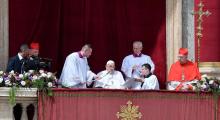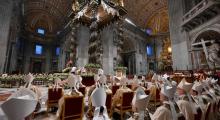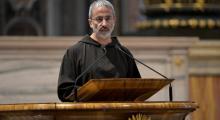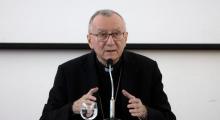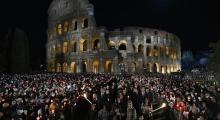Issued by the Catholic Center for Studies and Media - Jordan. Editor-in-chief Fr. Rif'at Bader - موقع أبونا abouna.org
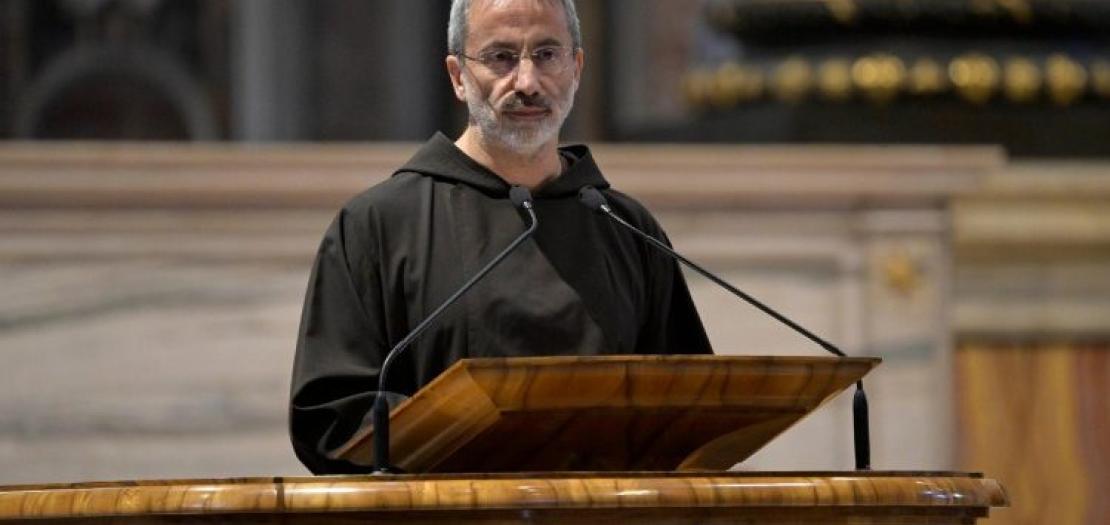
Papal Preacher gives sermon at solemn liturgy of the Lord's Passion on Good Friday in St. Peter's Basilica
As Pope Francis' convalescence continues, Cardinal Claudio Gugerotti, the Vatican's Prefect of the Dicastery for Eastern Churches, presided over the liturgy of the Passion and Death of Our Lord Jesus Christ in St. Peter’s Basilica on Good Friday afternoon. Good Friday is the only day of the year on which Holy Mass is not celebrated.
The Church celebrates the Solemn Liturgy of the Passion of the Lord, consisting of three parts: the Liturgy of the Word, culminating in the chanting of the Passion according to St. John; the Adoration of the Cross; and reception of Holy Communion.
Paradoxical victory
After the proclamation of the Passion, the Preacher of the Pontifical Household, Fr. Roberto Pasolini, OFMCap, delivered the homily.
Fr. Pasolini began by reminding us that at the heart of the Easter Triduum lies the mystery of Good Friday. Between the white of Holy Thursday and Easter Sunday, today’s liturgy, he observed, turns "red," "dramatically inviting us to meditate on the supreme love revealed in Christ’s Passion."
Yet, he suggested, this is not a day of defeat but of paradoxical victory.
The 'intelligence of the Cross'
The Papal Preacher invited us to reflect on the “intelligence of the Cross.” In a time when artificial and predictive intelligence dominates our thinking, the Cross offers a radically different form of wisdom—one that doesn’t calculate or compete but simply loves and gives. This intelligence is not artificial but deeply personal and open to God. In a world shaped by algorithms, the Cross restores authentic freedom—the freedom to love, even when it costs everything.
Fr. Pasolini turned to the Letter to the Hebrews, where we read, “In the days of His flesh, Jesus offered up prayers and supplications, with loud cries and tears... and he was heard because of His reverent submission.” (Hebrews 5:7)
At first glance, he noted, this is hard to accept, because one may ask how Jesus can be “heard” if He still dies on the Cross.
"The mystery," the Capuchin preacher responded, "lies in how the Father answered—not by sparing His Son suffering, but by empowering Him to embrace it freely. This “total abandonment” was Christ’s trust-filled acceptance of the Father’s will, even when it led through darkness."
Three moments
The Papal Preacher reflected on three moments in the Passion where Jesus models this trust. First, in the Garden of Gethsemane, when confronted by those who come to arrest Him, Jesus steps forward and says, “I am he.” (John 18:4–6)
This, he went on to clarify, is not resignation, but rather courageous initiative. “No one takes my life from me,” He had said, “but I lay it down of my own accord” (John 10:18). This moment, Fr. Pasolini marveled, shows us that even in suffering, we can choose to engage life fully. "In our illnesses, crises, and heartbreaks," he said, "we can face what is before us—not to change the outcome, but to remain free and rooted in faith."
Next, he highlighted the moment from the Cross when Jesus says: “I thirst”, (John 19:28) noting this thirst reveals Christ’s vulnerability. "He asks for what He cannot give Himself," he said, noting, "He shows us that love is not only giving, but also receiving."
Lastly, the Papal Preacher drew us to Jesus’ final words: “It is finished”, (John 19:30) noting this is not a cry of despair, but a declaration of fulfillment. "Jesus," the Italian priest reminded, "offers everything—His life, His Spirit—without reserve.
"In this final act," he continued, the Lord "reveals that true freedom and meaning come not from strength or control, but from surrender."
Entrusting ourselves
With this in mind, Fr. Pasolini recalled that in preparation for the Jubilee Year, Pope Francis reminds us that Christ is “the anchor of our hope.” (Hebrews 6:19)
Yet, he recognized, hope is hard to hold when we suffer. "The invitation today is to follow the exhortation of Hebrews: “Let us then approach the throne of grace with boldness, so that we may receive mercy and find grace to help in time of need.” (Hebrews 4:16) Thus, the priest acknowledged, we come to the Cross not to understand it fully, "but to trust its mystery—and to let that trust shape our lives."
For this reason, the Papal Preacher encouraged us to take part in the ancient and sacred act of adoration. As we approach the wood of the Cross today, he suggested, we don’t perform a ritual, but make a decision. "We choose to entrust ourselves to the way God has chosen to save the world. Not by removing suffering, but by walking through it with us."
Words of hope and comfort
The Cross, he recognized, does not promise comfort, but promises love.
Finally, Father Pasolini closed with words of hope. "We may not feel ready, and our strength may be small, but," he reassured, "the Holy Spirit fills our hearts with the gentle power of divine love," and therefore, "We can love—our friends, our families, even those who hurt us—because we have first been loved." (1 John 4:19)


